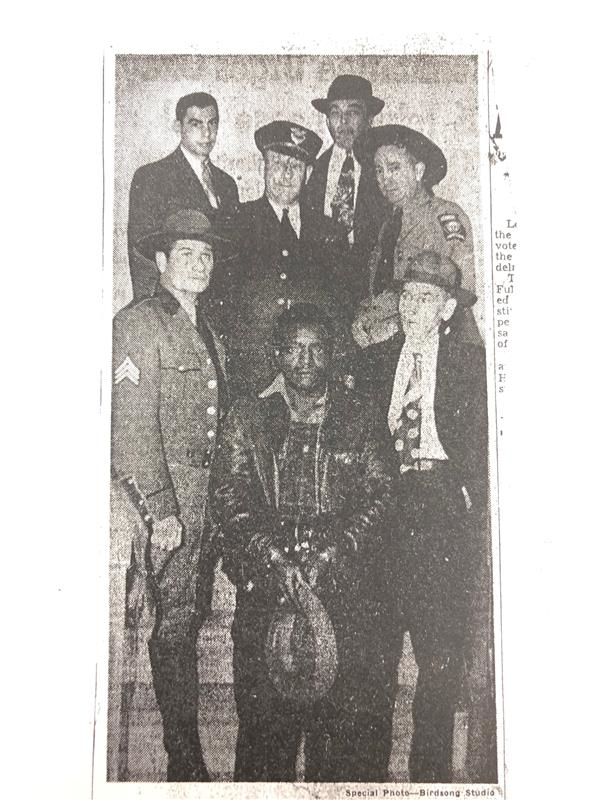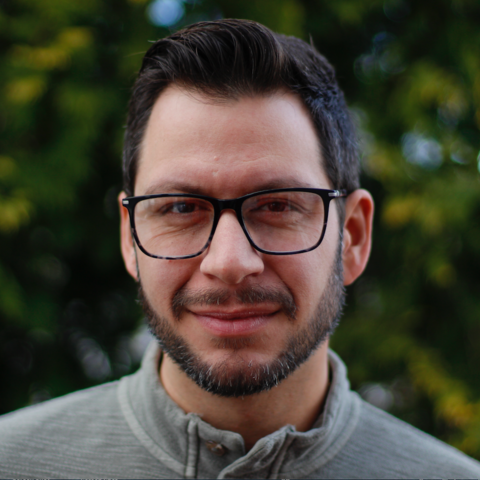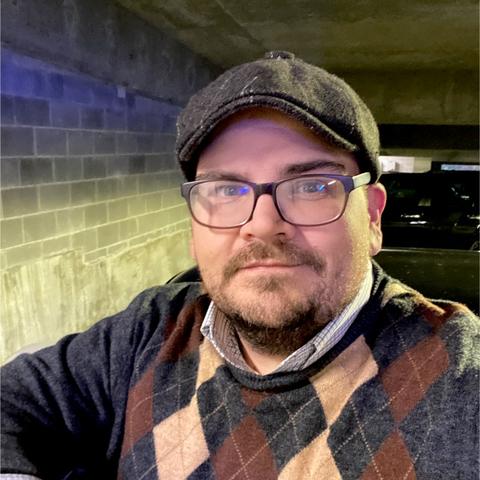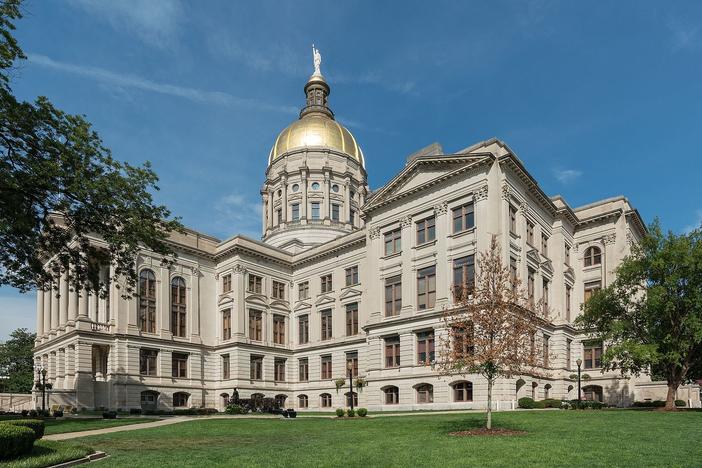
Section Branding
Header Content
Georgia Today: Violent protests at training center; Crossover Day; Kennesaw State hoops set to dance
Primary Content
LISTEN: On the Monday, March 6 edition of Georgia Today: Violent protest erupt at the site of the proposed police training center in Atlanta; we detail Crossover Day at the state capitol; and March Madness comes early as one local university earns its first-ever trip to the NCAA tournament.

Peter Biello: Welcome to the Georgia Today podcast from GPB News. Today is Monday, March 6. I'm Peter Biello. On today's episode, the proposed "Cop City" training center in Atlanta was attacked by protesters over the weekend. Today is crossover day at the state capitol. We'll have an update. And one local university has earned its first trip to the NCAA Tournament after an exciting win in their very first nationally televised game. These stories and more are coming up on this edition of Georgia today.
Story 1:
Peter Biello: The Atlanta Police Department says the site of a planned police training facility was attacked yesterday by a group that, quote, "threw large rocks, bricks, Molotov cocktails and fireworks at police officers." Police say construction equipment was destroyed. As of last night, 35 people have been detained. According to WSB, protesters had gathered on the site earlier yesterday for a rally and music festival as part of a, quote, "week of mobilization" against the training facility. Tensions have escalated in recent months between protesters and police. APD chief Darin Schierbaum says the attack was less about the training center and more about causing a disturbance.
Darin Schierbaum: This was a very violent attack. This wasn't about a public safety training center. This was about anarchy, and this was about the attempt to destabilize.
Peter Biello: Various groups had called for protests in the wake of the January shooting death of activist Manuel Teran after a confrontation with law enforcement who were clearing protesters from the site.

Story 2:
Peter Biello: It's Crossover Day at the state capitol, and lawmakers have already taken several key votes on major legislative issues. In the Senate, a measure that would ask Georgians to vote on a constitutional amendment legalizing sports betting and gambling failed to get a two-thirds majority needed to pass. Some opponents, like State Sen. Marty Harbin of Tyrone, warned of the negative impacts that come with betting.
Marty Harbin: I think we have to be very careful where we put things out to understand the consequences of what happens there. When we look at sports gambling, there's an addiction issue that's talked about. There's a lot of good things that we see from it, but there's also a lot of issues that are addiction.
Peter Biello: It's the second sports betting bill that failed in recent days, joining another Senate bill that would have authorized betting in horse racing without a constitutional amendment. Crossover day is typically the last day a bill has to pass out of one chamber to be considered by both houses for the remainder of the session. However, even if a bill isn't called or doesn't pass, it's not completely gone until next year. There are ways to amend bills that did pass out of one chamber to include virtually anything lawmakers want. For more updates on what did and didn't get passed on crossover day, go to GPB.org for the latest from the GPB news team at the Capitol.
Story 3:
Peter Biello: Clark Atlanta University has canceled classes for a week and postponed midterm exams after a student's near- campus shooting death. Sophomore Jatonne Sterling was killed last week. The university's president told students and faculty yesterday that he was designating this week off as Wellness days to, quote, "heal as a community." The announcement came on the same day the campus and nearby Spelman College were put on lockdown after police responded to nearby gunshots.

Story 4:
Peter Biello: Pennsylvania Gov. Josh Shapiro says Atlanta-based Norfolk Southern has agreed to pay $7 million for damages resulting from the company's train derailment last month along the state's border with Ohio. Separately, Norfolk Southern announced today a plan to enhance its safety operations based on preliminary findings from a federal agency that investigated the toppling of railcars carrying toxic chemicals last month.

Story 5:
Peter Biello: The district attorney for West Georgia's Carroll County last week formally dropped the charges against a Black sharecropper who was sentenced to death three times for a 1948 murder that he didn't commit. The sharecropper, Clarence Henderson, died more than 40 years ago after his convictions were overturned — also three times. The prosecution's cases were entirely circumstantial, with no eyewitnesses and all-white juries who convicted Henderson for the murder of a white man, Carl Stephens Jr. The charges, however, always stood against Henderson until a remarkable hearing last week. Brandon Henderson was one of the many Henderson family members in the courtroom. He's Clarence Henderson's great-grandson, and he spoke with GPB's Orlando Montoya.
Orlando Montoya: What did it feel like to be in that courtroom when the charges were dropped against your great-grandfather?
Brandon Henderson: When walking into the courtroom, to my surprise, I was taken aback. It was like I was almost hit with like a ton of bricks, only because of the sights — brought back a feeling of nostalgia. Although I had never been in that courtroom before in my life, I felt the amount of power that that room held simply because of the charges that he was facing. I'm almost certain that those charges carried either a death sentence or to die by lethal injection. It was a bit of confusion. It was a bit of anger. It was a bit of of joy, a lot of sad. But but overall, happiness because I knew why we were there and the purpose would be visible today.
Orlando Montoya: Did you feel like your great-grandfather was with you?
Brandon Henderson: Every step of the way. Every step of the way, whether that was, you know, him calming me down, ensuring that I feel confident and also comfortable being able to stand up and just speak on behalf of the family and just to represent him as a person as a whole, and continue our family's legacy, of course. I walk with him every day.
Orlando Montoya: Do you believe justice has been served in this case?
Brandon Henderson: I feel as though this is just the beginning to a long road of healing that we have to go through as a family. I feel as though the court system was able to get it right by dropping those charges against my great-grandfather, because we all knew from the beginning that he didn't do it. Of the accused charges, which they brought against him, he didn't do it. However, justice? I don't know if I can fully answer that question simply because, you know, the killer is still out on the loose and or he maybe he or she may be deceased.
Orlando Montoya: What do you want the world to know about your great-grandfather, that's not about this case?
Brandon Henderson: I'm a Henderson. I'm proud to be a Henderson. We are a family that depends on each other. We respect our moms, our dads, our siblings and ourselves. You will continue to see us, hear us and feel us in every woven fabric of what it is to be a Black American.
Peter Biello: That was Branden Henderson, Clarence Henderson's great-grandson. Orlando also spoke with Chris Joyner. He's the Atlanta Journal-Constitution reporter who has been researching the case for two decades. He's also the author of the book The Three Death Sentences of Clarence Henderson. Joyner also was in the courtroom last week.
Chris Joyner: There were some people, members of the general community, who were there, you know, people who had followed the case — either had read the book or had seen the coverage in the newspapers who were there. And there were about a dozen members of the Henderson family who were there, including Clarence Henderson's sole surviving child. You know, I've covered a lot of motions, hearings, and they're about the most boring thing you can see in a courtroom. In fact, sometimes they don't occur in courtrooms at all. And there was no reason why this one had to be in a courtroom. But the court and the district attorney chose to have it in public so that members of the family could attend. That in itself made it sort of unusual and dramatic. But more than that, they chose to have it in the historic Carroll County courthouse, in the courtroom where Clarence Henderson was tried three times.
Orlando Montoya: And why did the DA do it? Did he say? Because the DA, I don't think has said very much, but he must have made some statement.
Chris Joyner: The district attorney, Herbert Cranford, was not there because he had to deliver closing arguments in a murder case. His chief assistant was there, delivered the message for the office. After my book published, I began pursuing this as the sort of natural story that came out of the book. It occurred to me after the book was published, and I became more acquainted with the Henderson family that, you know, the charges were still active and could possibly be dismissed. District Attorney Cranford, when contacted, agreed when he talked to members of the Henderson family, agreed to reopen the case for possible dismissal. Didn't — didn't take him very long because he — he told me and he told the family, you know, when a case has been overturned three times on evidentiary reasons, there's obviously a problem with it. And he found that there was not evidence to sustain a conviction against Clarence Henderson. So it was a fairly easy decision for him to drop it.
Orlando Montoya: It just seems like it took so long, and I can't explain that other than to say that there was some sort of change, which was the new DA, obviously. But was there, did it feel like this was part of something larger conversation going on in Carrollton?
Chris Joyner: Part of it's just the passage of time. When I first started looking at this case, I was a young reporter working at the newspaper in Carrollton, and I had community members who were waving me off of it, said that I shouldn't dig into it because there were still raw feelings. And that was, you know, 50 years after the events. But there were still plenty of people who were, you know, invested in outcomes in that case. When I began seriously working on it as a book project about five or six years ago, a lot of that had changed over time. And I think sort of that generational removal makes it a little easier to dispassionately look at the case, realize that there were problems with it. You know, even — even if this were a modern case, there would have been problems with the evidence. But if you add on to that the fact that it was occurring in a highly segregated society where Black defendants were treated as second-class citizens at best, and they were people who told me, you know, that they were grateful that I had written the book and that this was happening. And I think District Attorney Herb Cranford in his motion, said he had heard from citizens white and Black, young and old, all supportive of this.
Orlando Montoya: I think congratulations is not something you like to say to a reporter, but it sounds like this was the outcome that everybody wanted so long ago.
Chris Joyner: Well, as a journalist and particularly an investigative journalist, you just hope that the work that you put into something is going to provoke change. In the case of this story, you know, I was first attracted to it just because I was really interested in the story. That it could provide this sort of resolution for the Henderson family is such a unexpected blessing, really.
Peter Biello: That was Chris Joyner, an Atlanta Journal-Constitution investigative reporter and the author of the book The Three Death Sentences of Clarence Henderson. He was speaking with GPB's Orlando Montoya. District Attorney Herbert Cranford agreed to reopen the case at the request of a Henderson family member.
Story 5:
Peter Biello: Savannah is home to one of the country's largest Saint Patrick's Day celebrations, including its parade. Now in its 199th year and this year's festivities will offer an eco-friendly souvenir. GPB's Benjamin Paine reports.
Benjamin Payne: To-go cups are nothing new in the city's downtown historic district, where open container laws allow people to drink outdoors. But this is the first time downtown bars and restaurants will hand out reusable, recyclable aluminum cups designed by a local artist for Savannah's popular St Patrick's Day parade. That artist is Brittany Curry, who goes by Inky Brittany.
Brittany Curry: I'm really excited that there are going to be thousands of people coming into Savannah and leaving with a cup that will probably stay in their cupboard, and hopefully be used over and over again, that will have my design and work on it forever.
Benjamin Payne: Her design features six shamrock silhouettes encircling six Savannah landmarks, among them the Forsyth Park Fountain, the Bird Girl Sculpture, and the Cathedral Basilica of Saint John the Baptist. For GPB News, I'm Benjamin Payne in Savannah.

Story 6:
Peter Biello: Kennesaw State University has earned its first Atlantic Sun Conference championship and its first trip to the NCAA Tournament. It came in a win last night over the Liberty University Flames in the Owls' first-ever nationally televised game from KSU as broadcast on ESPN2.
ESPN2 Announcer 1: I think he should miss this free throw.
ESPN2 Announcer 2: That's a good point, Tim.
ESPN2 Announcer 1: If he makes it, they can throw the ball down and get some type of a quick shot.
ESPN2 Announcer 2: Burdon. He does! That's it! It's over!
Peter Biello: Kennesaw State University will bring a school record 26 and 8 mark to their first big dance.
Peter Biello: And that's a wrap on today's edition of Georgia Today. Thank you so much for listening. One more thing, baseball fans: We are exactly a month away from the Atlanta Braves home opener against the San Diego Padres. I cannot wait. If you haven't hit subscribe on this podcast, now's the time to do it. We've got a week's worth of news coming your way. If you subscribe now, we'll be in your podcast feed every weekday afternoon. And if you've got feedback, we'd love to hear it. Send us an email. The address is GeorgiaToday@GPB.org. I'm Peter Biello. Thanks again for listening. We'll see you tomorrow.
——
GPB's Georgia Today newsletter hits your inbox on Tuesdays, Wednesdays and Thursdays with top stories from around the state featuring news, politics and more. Subscribe here.






